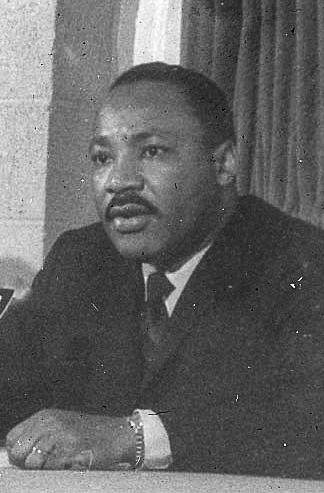St. Joe’s achievements since MLK’s speech
The community of Saint Joseph’s College, now called Saint Joseph’s University, had an opportunity to host Martin Luther King Jr. and to hear his wonderful voice in the Alumni Memorial Fieldhouse in the fall of 1967.
As always, his voice was inspiring, even as he spoke strongly in criticism of the war in Vietnam and forcefully lamented the ongoing lack of attention toward widespread poverty in America. He spoke. He was heard.
Even after his assassination, not too many months following the visit to St. Joe’s, he has continued to have a place in institutional memory—although the inaccurate transcription of his talk, and subsequent garbling of his words on the bronze plaque placed in the fieldhouse years later in his honor, suggest that the institution could have been more carefully attentive to his message.
Linked indelibly to King’s on-campus speech are St. Joe’s subsequent actions to bring his hopes for a more fair and more just America to reality. Here and elsewhere, progress has been slow, but by the 50th anniversary of that visit, forward movement is discernible. The faculty of St. Joe’s is significantly more diverse in race and gender than it was in 1967.
The current student body, likewise, reflects more of the diversity that is America than was true back then, although the students who completed their studies under cover of the night both in 1967 and for a few subsequent decades were more diverse than their daytime peers. Mission statement by mission statement, generation after generation, St. Joe’s has reflected more and more of what King held dear. King would have a smile for all of these developments.
In terms of curriculum offerings and opportunities for learning, our progress would likely please King. Students now may take courses in the Africana studies program, which provides opportunities for a minor with courses distributed across several departments in the College of Arts and Sciences. Other fine opportunities for diversity education are the gender studies minor, the Asian studies major/minor, the autism behavioral studies major and the Latin American studies minor.
When I joined the English Department in 1979, I arrived from graduate school at the University of North Carolina, which had been integrated just a few years before my time there began. The English graduate faculty had one African American member, Blyden Jackson, Ph.D., and I took his course in African American literature. Jackson knew several members of the Harlem Renaissance; he was superbly well prepared to guide us in our exploration of literary texts far beyond the experience of his students—all white. He was glad to teach us, but I think we all knew at some level how challenging it would be to teach this subject to us—that we would never be able to approach the texts with his perspective.
Accordingly, when I started teaching at St. Joe’s, I was hesitant to encroach on territory not mine by origin, and it was more than 15 years before I offered a course in African-American literature; that course had small enrollment, about a dozen students, but they were pleased with it, including several African-American students.
An alternative to offering courses specific to minority studies is to include a diversity of authors in as many courses as possible, and over the past 20 years, that has been my usual approach to addressing matters of equality and social justice, a pattern similarly employed by my colleagues in English and other departments. “Include significant differences”—that is the mantra.
Diversity is good. Even age is a diversity factor of some consequence, and in this area, my expertise is growing steadily. One of my all-time favorite course offerings—Cultural Diversity: American Voices—presents a rich tapestry of writers with a wide range of backgrounds and identities, all organized to feature the wonder of diversity.
So, would King present us an “A” for our achievements? I don’t think so, kind and generous though he was. We have moved mostly in the right direction, but there are significant miles to go before we can sleep easily. In all ways, more diversity is necessary. King’s presence is still palpable, still with us, still pushing us to rise higher in our reach toward a justice that leaves no one out.
Push on, St. Joe’s, keep on pushing.














































